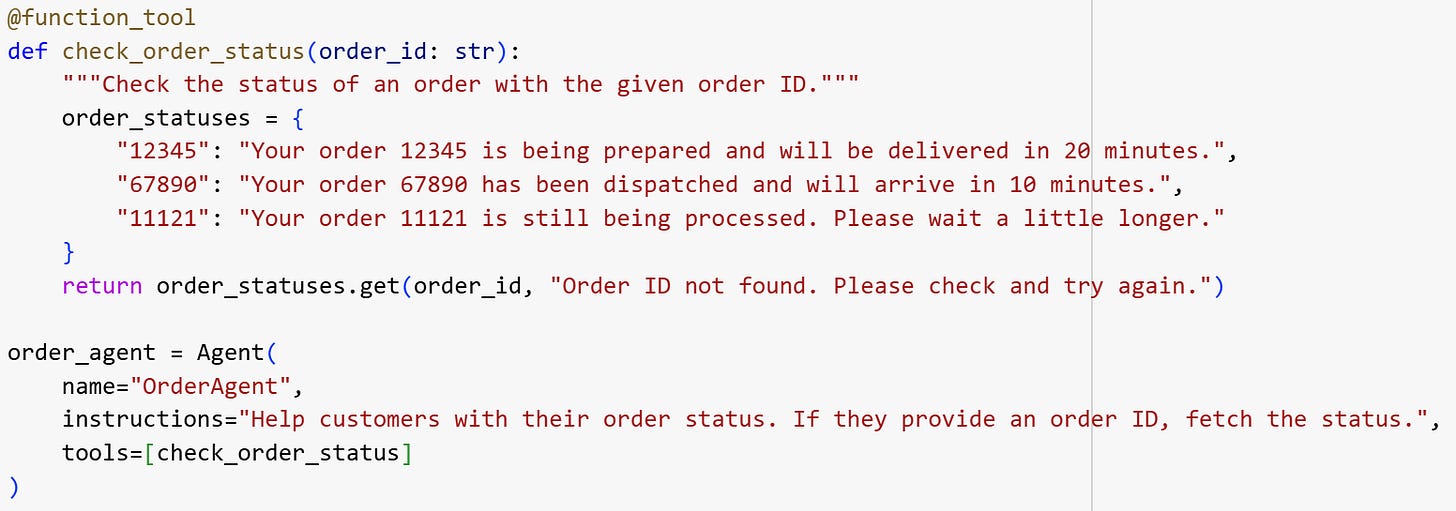Building a Multi-Agent System with OpenAI Agents SDK - Part 1
OpenAI recently released their Agents SDK, a lightweight yet powerful framework for building multi-agent workflows. Unlike the experimental OpenAI Swarm released last year, this SDK is production-ready and offers one of the most straightforward implementations of multi-agent orchestration currently available.
In this tutorial, we'll build a Restaurant Customer Support system using multiple specialized agents that can handle different types of customer queries automatically.
What is OpenAI Agent SDK?
The OpenAI Agent SDK provides a framework for creating multi-agent systems where specialized agents handle specific tasks. The core concepts include:
Agents: The fundamental building blocks powered by language models and configured with specific instructions and tools
Handoffs: The ability for agents to delegate tasks to other specialized agents
Guardrails: Concurrent checks and validations that ensure interactions adhere to predefined criteria
Tools: Functions or methods that agents can use to retrieve or manipulate data
Building a Restaurant Support System
Let's create a customer support system for a restaurant that can:
Check order status
Answer FAQs
Handle complaints
Manage table reservations
Setting Up the Environment
First, install the required package - that is all you need:
pip install openai-agents
Creating Our Agents
The Classifier (Triage) Agent
This agent serves as the entry point, determining the intent of customer queries and routing them to specialized agents.
The handoffs parameter is the key here - it takes a list of specialised agents as arguments.
The rest of agents look like below. Instead of handoffs we pass the tool/method the agent can use to process the task/ user query.
For example - in the case of order_agent, I have oversimplified the check_order_status tool that it uses to check the status of an order.
In a real use case, this function could be making an API call, or fetching the order status from a database.
We use @function_tool decorator to denote a method as a tool for an agent. This function can be used with an agent. It just needs be passed as an argument to the tools parameter in the Agent class.
FAQAgent, ComplaintAgent and ReservationAgent are also setup as above with their own relevant functions.
Running the Multi-Agent System
To create an interactive chat interface, the most important entity is to establish context or conversation history.
We can simple add “response.to_input_list()” which has the context from previous query added.
This makes it a very efficient chat interface.
Testing the System
Let's test our multi-agent system with various queries:
You will see that the agent can easily identify the intents and route them to specialised agents for processing.
All agents are easily able to extract relevant arguments for their tools and execute the functions.
Benefits of This Approach
Modularity: Each agent handles a specific domain, making code organization cleaner
Specialized Knowledge: Agents can be optimized for particular tasks
Maintainability: Add or modify agents without affecting the entire system
Contextual Understanding: The system maintains conversation context between interactions
Conclusion
The OpenAI Agent SDK provides a streamlined way to build powerful multi-agent systems. In this tutorial, we built a restaurant customer support system using specialized agents that can handle different types of queries. This approach provides a clean, modular architecture that can be extended to handle more complex use cases.
In a future tutorial, we'll explore more advanced features like guardrails and tracing to enhance the robustness and debuggability of our multi-agent system.






